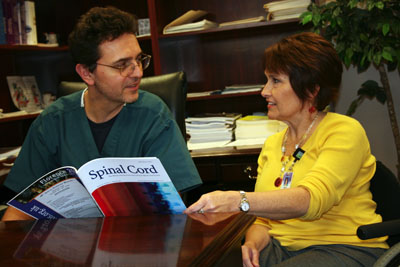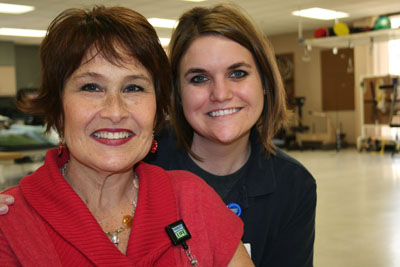

Reality bites.
For Karen Skeen of Madison, one of those horrifying moments built on circumstance, happenstance and uncertainty came back into focus the other day.
She rolled her wheelchair into the sixth-floor therapy room at Methodist Rehabilitation Center in Jackson and was sideswiped by the memories.
“When they first wheeled me in here, I burst into tears,” she says.
“We rolled right back out,” physical therapist Erin Bischofberger recalls.
Skeen had been knocked down. She didn’t know if she’d be able to get up, go back to being a mother of four girls, a functioning human being. Would she ever again be the person she thought she’d been her whole life?
Her nightmare began innocently enough. Skeen was among the chaperones escorting 17 Madison Central High School students, including her daughter Anna, on a 2008 spring break cruise to Mexico.
Some of the group decided to spend March 17 exploring a series of caves and caverns in a remote area of the Yucatan Peninsula. Skeen wore a new “lucky” green swimsuit in honor of St. Paddy’s Day.
“They were basically holes in the earth,” says Skeen. “We were snorkeling with the girls in deep blue water. You could see the bottom. We were having a blast.”
The boys were jumping from the top down into the water. Skeen climbs to the edge of the crater for a look – and plummets fanny first toward the water.
“For the life of me, I don’t know what happened,” Skeen says. “If I had gone in straight, I would have been OK. I was instantly paralyzed, dog-paddling.”
A guy, who turned out to be an EMT, swam up to her.
“Are you OK?”
“I can’t move my legs.”
“He thought it was probably just the shock,” Skeen says today.
He was wrong.
Unspeakable Terror
The aftermath of the accident was terrifying. Skeen can’t feel her legs. She’s in the water. In a cavern surrounded by steep walls. In a foreign country. Doesn’t speak Spanish. Still scrunched up, knees to chest, just the way she hit the water. Too scared to move. Unable to move. Already drifting between unconsciousness and bouts of ferocious agony.
“Having babies is like a 20 on the pain scale. This was like a 30,” Skeen says.
Rescuers carried Skeen up a steep flight of wooden steps. Then she endured a tortuous, 90-minute donkey cart ride to civilization, every sway and bump an assault on her nervous system. Medical help was still hours away.
Once she was stabilized at a Merida hospital, plans were to fly her to Jackson Memorial Hospital in Miami for surgery to repair shattered vertebrae in the middle of her back. But time was short, the plane was on another mission and it was decided that surgery couldn’t wait.
“Anna was a wreck. I was barely conscious and in excruciating pain. I knew something had to be done.”
When she awoke from the surgery, Skeen was hysterical. “I couldn’t feel my legs. I thought they were amputated. And I kept crying and screaming and saying: I’m a nurse. I’ve got rights. I know you can’t cut my legs off without asking me.”
As they tried to calm her down, the nurses, who couldn’t speak a word of English, just kept agreeing with Skeen. “Si, we amputate,” they said.
“We tried to calm her to no avail,” said Skeen’s friend Alexis Day, who fortunately spoke fluent Spanish. “We explained to the nurses what was going on and they called the doctor, who gave her a strong sedative.”
Meanwhile, work was under way to return Skeen to the states. It took two planes — one broke down — and $28,000 charged to her American Express card (don’t leave home without it) to get her to Jackson Memorial.
The next big decision: Where to rehabilitate? Atlanta? Birmingham? Where? “The answer came back,” Skeen says. “There’s no place better than Jackson, than Methodist Rehab.”
An Amazing Journey
“They start from the minute you arrive planning your discharge,” she says. Skeen began her journey near the bottom. In physical therapy lingo, the scale runs from zero to five, from no muscle reaction to genuine strength.
“When I went in, I was at zeroes and ones. A month later, when I left, I was at threes and fours.”
The trek back from the depths of that watery cavern in Mexico has been long and hard and focused. “I’ve been to hell and back,” Skeen says. “There was a great big black hole I wasn’t sure I could get out of. It’s been an amazing journey.”
Part of the trip was built on sweat, the other on heart. “We worked from 8:30 a.m. until 3 p.m. with one hour off for lunch,” Skeen says. “Then we had group from 3 to 4 p.m. They cover everything.”
Bischofberger took care of the muscles. Occupational therapist Suzanne Colbert provided tactical support, the how-tos of daily living.
“Karen has an ideal attitude,” Bischofberger says. “It’s fun to work with someone who wants to work that hard. It’s an inspiration.”
Colbert’s job? “Activities of daily living. Home management.” How to make a cup of coffee, cook dinner, go from chair to bed and back to chair. “Transfers,” in therapy talk. “She taught me how to sweep,” Karen says, laughing.
The docs keep you alive, the PT gives you strength, the OT teaches you how to live in your new circumstances. Then there’s the mental part, which presses itself on every breath every day.
That’s where the care and compassion of the nurses gets you through, said Skeen, a nurse herself. “There were times when they just came in and held me while I cried.”
Skeen knew that her recovery from a spinal cord injury would be a challenge. “I was going to work my tail off and beat this,” Skeen says. “I really thought I was going to wake up one day and this would be over. I would be OK. There was not a doubt in my mind.”
Somewhere along the way certain realities set in and it can be a harrowing and lonely experience coming to terms with the situation. Eventually, you become accustomed to the new you, Skeen says. You realize that you’re still you in all the most important aspects, that “there is always somebody who has got it much worse,” that courage and character don’t hinge on getting a bad break, but on how you react to it.
As she healed both physically and emotionally, Skeen felt the need to reach out. “I told Methodist Rehab CEO Mark Adams: ‘I’m coming back to work here, you know! He said: Come on, I’ll find a place for you.”
And he did. Skeen now assists senior scientist Dobrivoje Stokic, MRC Administrative Director for Research.
One of Skeen’s duties is to interview MRC spinal cord injury patients about their recovery process. The work helps identify how abilities are restored, and gives researchers insight into the real-life problems facing patients.
“Karen experienced an injury herself, and she knows how to approach injured people,” Stokic says. “It’s an easier connection. She’s a registered nurse, and there’s great value in having her in that role.
“She obviously has a great personality that speaks to her ability to cope with the consequences of her injuries. It is remarkable how quickly Karen integrated back into the community. She serves as an example to other people in how to restore their lives.”
“With the research I’m doing now, I get to interact with patients and relate to people,” Skeen says. “This person from a year ago is now out in the world. There is great joy.”
And reality? It tastes like victory.